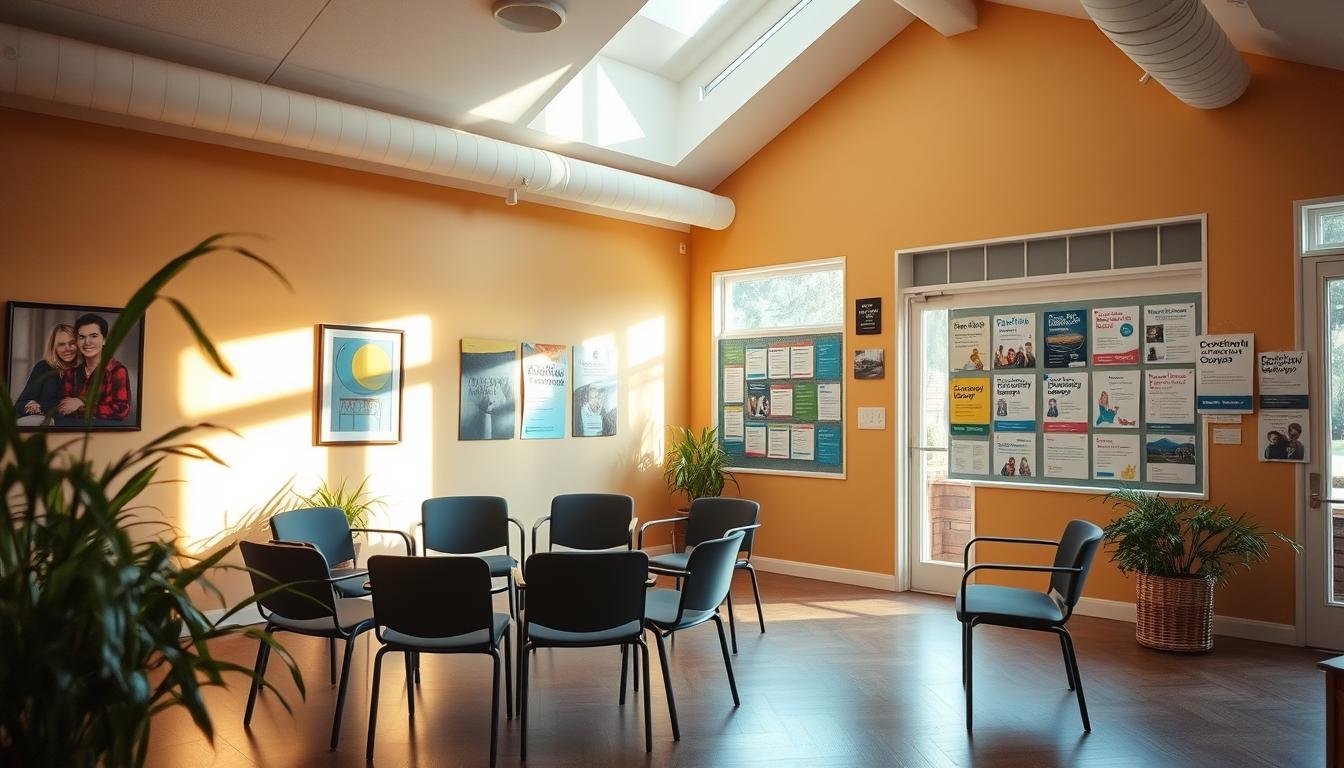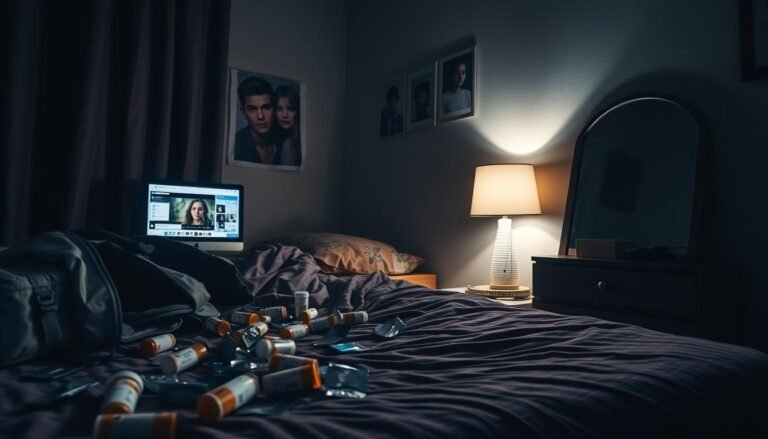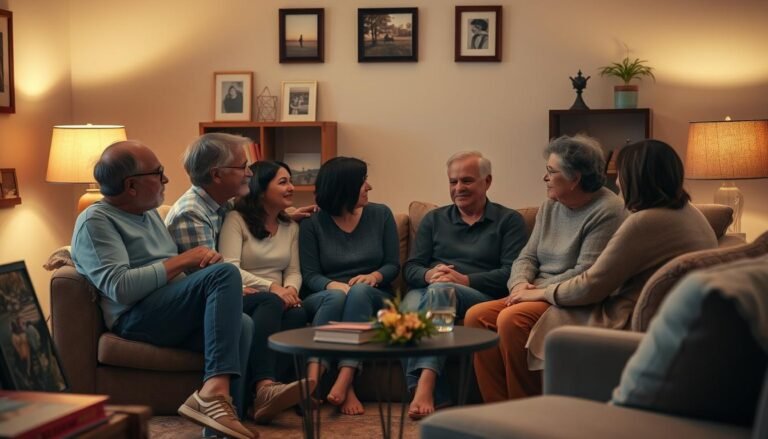Find Local Addiction Support Resources Available Now
The path to recovery is tough, but you’re not alone. Across the United States, many addiction support resources are ready to help. They can guide you or your loved ones towards a life free from addiction.
Whether you’re dealing with substance abuse, alcoholism, or addiction’s impact on your family, help is near. You don’t have to face this alone.
Key Takeaways
- Substance abuse treatment and recovery programs are available nationwide to support individuals and families affected by addiction.
- SAMHSA’s National Helpline provides free, confidential referrals to local treatment facilities, support groups, and other resources.
- Alcohol Treatment Navigator and other online tools can assist in navigating the complex landscape of addiction treatment options.
- Addiction hotlines and crisis support services offer immediate assistance and connection to emergency services when needed.
- Exploring local support groups and recovery communities can provide essential peer-to-peer support during the recovery journey.
Understanding Addiction and the Need for Support
Addiction is a complex issue that affects many people and families. Recent statistics show that 1 in 6 Americans have a substance use disorder. In 2022, about 6.1 million people aged 12 and older had an opioid use disorder. Also, around 4.5 million people in the U.S. struggled with a stimulant use disorder.
Recognizing Signs of Substance Abuse
It’s important to recognize the signs of substance abuse early. Look for changes in mood, behavior, and physical appearance. Also, watch for a strong focus on getting and using the substance. Addressing these signs early can help prevent addiction from getting worse.
Impact on Individuals and Families
Addiction affects not just the person struggling but also their families. It can strain relationships, disrupt daily life, and cause financial problems. It’s vital to know that addiction is treatable. Support networks can help individuals and families through the recovery process.
The Importance of Early Intervention
Early intervention is critical in addressing substance abuse and addiction. The FDA has approved three main medications for opioid use disorder. These medications have been shown to help people overcome addiction and stay in recovery.
There are also other treatment options like cognitive-behavioral therapy and outpatient counseling. Recognizing addiction early and seeking support can greatly improve recovery chances. Understanding addiction and available resources helps individuals and families tackle this public health issue.
| Type of Addiction | Estimated Number of People Affected |
|---|---|
| Opioid Use Disorder | 6.1 million |
| Stimulant Use Disorder | 4.5 million |
| Alcohol or Other Drug Addiction | 23 million |
“Addiction is a chronic, relapsing brain disease that is characterized by compulsive drug seeking and use, despite harmful consequences. It is considered a brain disease because drugs change the brain’s structure and how it works.” – National Institute on Drug Abuse
Emergency Hotlines and Immediate Assistance
When you’re in a crisis with substance abuse or mental health, quick help is key. Luckily, many hotlines and crisis services are ready to help across the country. They offer confidential advice and connect you with the help you need.
SAMHSA’s National Helpline Services
The Substance Abuse and Mental Health Services Administration (SAMHSA) runs a free, confidential 24/7 National Helpline at 1-800-662-HELP. This service helps by giving referrals to treatment, support groups, and community services. It’s for those dealing with addiction hotlines, mental health problems, or both.
Crisis Support Options
- The National Suicide Prevention Lifeline is at 988, helping those in suicidal or emotional crisis.
- The LGBTQ+ National Hotline at 1-888-843-4564 offers special support and resources for the LGBTQIA+ community.
- The NAMI Helpline at 1-800-950-6264 gives peer support, information, and practical help for mental health issues.
- The Al-Anon and Alateen Hotline at 800-356-9996 supports those affected by a loved one’s alcohol addiction.
24/7 Emergency Resources
There are also local and regional groups that offer crisis support and 24/7 emergency resources. They provide community counseling, mobile crisis teams, and help finding treatment programs.
By calling these hotlines, you can get the support and guidance you need. It’s the first step towards recovery and healing.
Navigating Treatment Options Without Insurance
For those without health insurance, finding affordable addiction treatment is tough. But, there are many ways to get help, even if you don’t have insurance.
The Substance Abuse and Mental Health Services Administration (SAMHSA) is a big help. It’s a government agency that helps treatment centers across the U.S. Many of these places offer free or low-cost treatment. They look at things like where you live and how much money you make.
Also, many programs and centers charge based on how much you can pay. Grants and scholarships can help with costs. Some places even let you pay in small steps over time.
| Treatment Option | Details |
|---|---|
| SAMHSA-Funded Programs | Free or low-cost addiction treatment with specific admission criteria |
| State-Funded Programs | Treatment centers that operate on a sliding scale based on income |
| Grants and Scholarships | Financial assistance to help cover the cost of addiction treatment |
| Payment Plans | Flexible payment options offered by some treatment facilities |
Finding treatment without insurance is hard, but it’s not impossible. There are many resources and people ready to help. By looking into these options, you can start your journey to recovery and a better life.
“Everyone deserves access to quality addiction treatment, regardless of their financial situation. With the right resources and support, recovery is possible for all.”
Free and Low-Cost Addiction Support Resources
Overcoming addiction can be very expensive. But, there are free and low-cost options for those in need. State-funded programs, sliding scale payments, and grants can help make treatment affordable for everyone.
State-Funded Programs
Every U.S. state helps fund addiction services, even for those without insurance. The Substance Abuse and Mental Health Services Administration (SAMHSA) has a directory of state agencies. These programs offer a wide range of treatments, like counseling and medication-assisted therapy.
Sliding Scale Payment Options
Many treatment centers offer payment plans based on income. This helps those with less money get the help they need. Some faith-based centers also offer free or low-cost programs, but they might be limited.
Grant and Scholarship Opportunities
Grants and scholarships can help pay for treatment. Organizations like SAMHSA and state agencies fund these programs. They can’t cover everything, but they help a lot.
| Resource | Description | Availability |
|---|---|---|
| State-Funded Programs | Addiction services funded by state governments, often for the uninsured | Available in all U.S. states |
| Sliding Scale Payment Options | Treatment costs adjusted based on income and dependents | Offered by many addiction treatment centers |
| Grants and Scholarships | Funding opportunities to offset the cost of addiction treatment | Provided by government agencies and nonprofit organizations |
Exploring free addiction support and low-cost treatment options can help. State-funded programs are a big help for those without insurance.
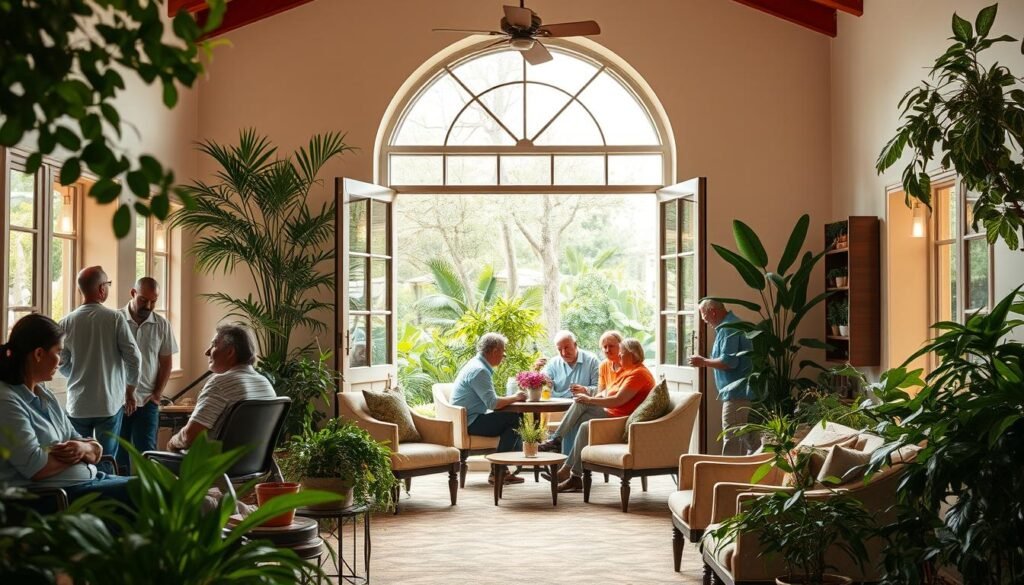
Local Support Groups and Recovery Communities
Local support groups and recovery communities are key in the fight against addiction. They offer a safe space for those struggling with addiction and their families. Here, they can find comfort, guidance, and a sense of belonging.
The Alcoholics Anonymous (AA), Narcotics Anonymous (NA), and Cocaine Anonymous (CA) 12-step programs are well-known. They have both in-person and online meetings. SMART Recovery uses science to help with various addictions, with over 3,000 weekly meetings.
Al-Anon and Alateen help families and friends of addicts. They offer support groups to help during and after treatment. This support is vital for ongoing recovery.
“Attending support groups during and after treatment for drug or alcohol addiction can help a person maintain their sobriety,” according to the National Institute on Drug Abuse (NIDA).
There are many support groups beyond traditional 12-step programs. Medication Assisted Recovery Anonymous (MARA) helps those using medications like Suboxone. Phoenix Recovery offers free activities like camping and sports for a sense of community.
Online support group meetings are becoming more common. They help those who can’t make it to local meetings. These digital communities provide valuable connections and resources for recovery.
Local support groups and recovery communities are essential for overcoming addiction. They offer a supportive network and tools for lasting recovery. By connecting with these resources, individuals can find the support and guidance they need.
Professional Counseling and Therapy Services
Getting help from professional addiction counseling and therapy is key to recovery. These services offer the support and guidance needed to beat substance abuse. They help keep sobriety going for the long haul. There are many options, from one-on-one counseling to group therapy, to meet the needs of individuals and families.
Individual Counseling Options
Individual counseling with licensed therapists or doctors is a personal and private way to tackle addiction. It’s a safe place to talk about why you’re addicted, learn coping skills, and set recovery goals.
Group Therapy Programs
Group therapy uses the power of shared experiences and peer support to help with addiction recovery. It combines cognitive-behavioral therapy, skills building, and contingency management. This helps participants build a strong base for staying sober.
Family Support Services
Addiction affects more than just the person struggling. It impacts families and loved ones too. Family support services help those supporting someone in recovery. They offer counseling, education, and resources to strengthen relationships and improve overall well-being.
Many therapy services offer free first meetings to see if they’re a good fit. Looking into these professional resources is a big step towards getting the help needed for addiction recovery.
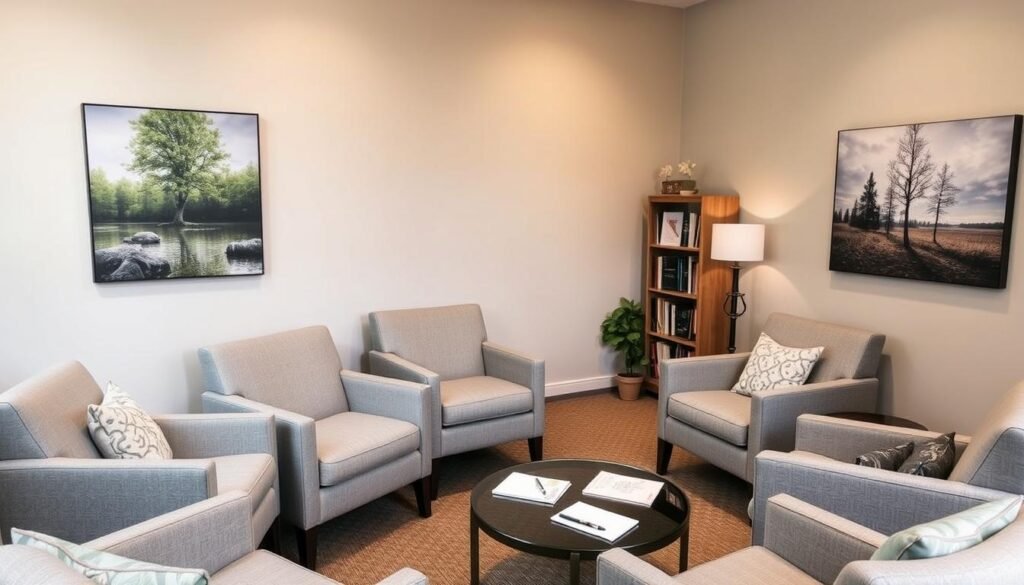
Medicare and Medicaid Coverage for Addiction Treatment
Finding your way through the healthcare system can be tough, but it’s easier when you know about Medicare and Medicaid. These two big government programs help make addiction treatment more affordable.
Medicare Addiction Coverage: Medicare is for people 65 and older or those with disabilities. It covers many behavioral health services. This includes inpatient and outpatient care, and even helps with addiction medicines through Medicare Part D.
Medicaid Substance Abuse Treatment: Medicaid is for low-income families and individuals. It’s part of the Affordable Care Act. People making less than 133% of the poverty level might qualify. Medicaid often covers screenings, medications, and inpatient care for addiction.
Medicare and Medicaid are key in making addiction treatment affordable. Knowing what they cover can help those seeking Medicare addiction coverage or Medicaid substance abuse treatment start their recovery.
| Coverage | Medicare | Medicaid |
|---|---|---|
| Inpatient Rehabilitation | Up to 60 days without co-insurance payment | Varies by state |
| Outpatient Care | Up to 80% of costs | Typically covers all or part of services |
| Prescription Medications | Medicare Part D covers many addiction medications | Varies by state |
| Eligibility | Individuals 65+ or with certain disabilities | Individuals with incomes below 133% of federal poverty level |
Remember, what Medicare addiction coverage and Medicaid substance abuse treatment cover can change by state and person. Looking into your options and talking to healthcare providers is key. This way, you can get the right help for your recovery.
Online Recovery Tools and Digital Resources
In today’s world, online tools and digital resources are key for those fighting addiction. They offer new ways to get help, beyond just in-person meetings. These platforms meet the needs of many people on their recovery paths.
Virtual Support Meetings
Virtual support meetings are easy and open to all. Sites like Zoom and online forums host these meetings. People can share their stories, get support, and talk with others from home.
Mobile Apps for Recovery
Many mobile apps help with addiction recovery. Apps like AA Big Book, SMART Recovery, and I Am Sober help find meetings, track progress, and offer tips. They keep users motivated and on track.
Educational Resources
There’s a lot of info online about addiction and recovery. Sites like AddictionHotlineToday.com, HabitRecovery.com, and RehabMe.org have the latest facts and advice. They help people make smart choices about their recovery.
Using online recovery tools and digital resources helps people get virtual support. It breaks down barriers to treatment and recovery services. It makes help more accessible to everyone.
Faith-Based Recovery Programs
For those looking for addiction support with a spiritual twist, faith-based recovery programs are a great option. The Salvation Army’s adult rehab centers offer counseling, work therapy, and life-skills training with a Christian base. These programs welcome people of all faiths, helping them find recovery that fits their beliefs.
Research shows spirituality’s big role in beating addiction. About 82% of patients who had a spiritual awakening stayed sober for a year. This is compared to 55% without a spiritual part in their treatment. Groups like Alcoholics Anonymous stress the need for a higher power. Christian programs like Celebrate Recovery and Catholics in Recovery use biblical teachings with the 12-step method.
The faith community is key in helping people with mental health and addiction. Organizations like SAMHSA work closely with faith groups. They offer grants and support to help these groups provide vital services to those who need them most.
